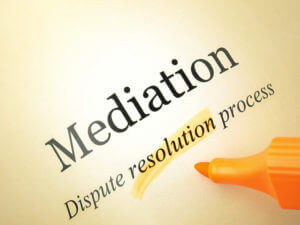When it comes to getting a divorce not everything has to be a knock-down, drawn-out affair for both parties. Divorce mediation can help avoid court and resolve numerous questions. Mediation is one of the most frequently used methods of alternative dispute resolution when it comes to negotiating a divorce settlement.
Here are a few facts about Mediation that will help answer common questions about the process.
What is Mediation? Mediation is used to settle disputes when two parties are unable to agree or settle a disagreement. It is not binding unless an agreement is reached.
What is a mediator? In mediation, several people will be present such as, the parties, their attorneys, and the mediator. A mediator is a neutral party that is specially trained to help the parties create a fair and reasonable divorce agreement. The goal for every mediator is to reach an agreement that both parties are happy with, or that they can at least live with.
What is discussed in Mediation? Several divorce matters are discussed while in mediation. You and your soon to be ex-spouse need to decide more than a few important issues. The most common issues that are discussed are: distribution of property/assets/liabilities, child custody, child support, retirement, taxes, and more.
How long does mediation take? The length of mediation can vary on what issues have to be agreed upon. Also, the length of time spent in mediation can be determined by you and your spouse’s willingness to cooperate and come up with an agreement. Divorce mediation can be completed in as little as a couple of hours to an entire day.
What happens after Mediation? Depending on if both parties have come to an agreement or not will determine what will happen after mediation. In most cases, mediation results in the parties leaving with a written and signed agreement. The agreement will lay out every detail that the parties agreed on. The agreement is then filed in the Court and will be ratified by a Judge.

